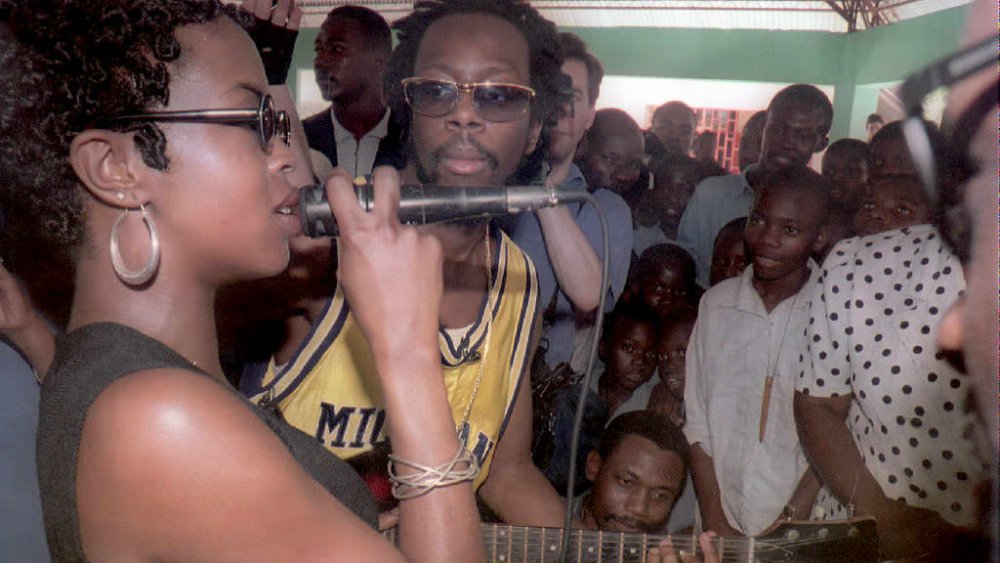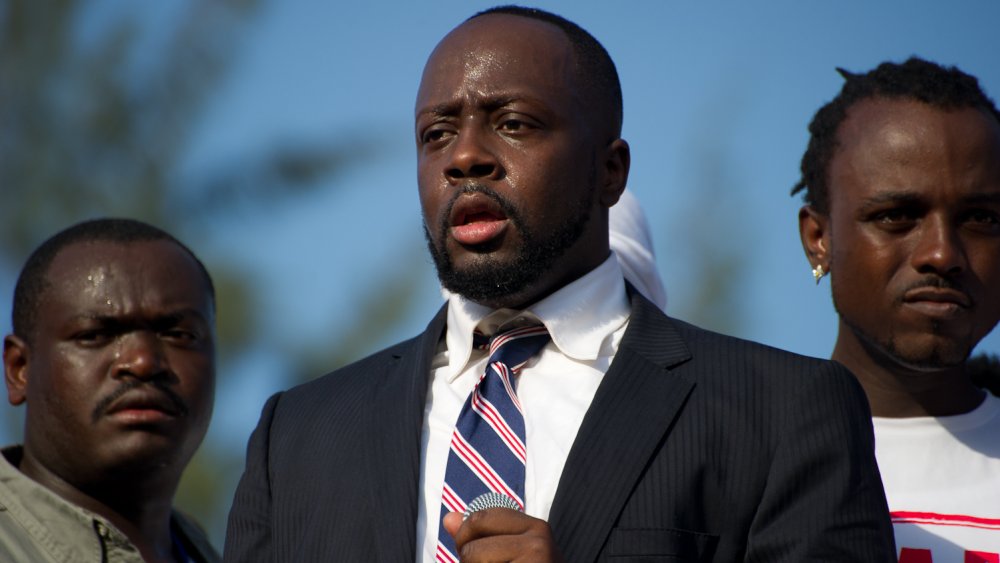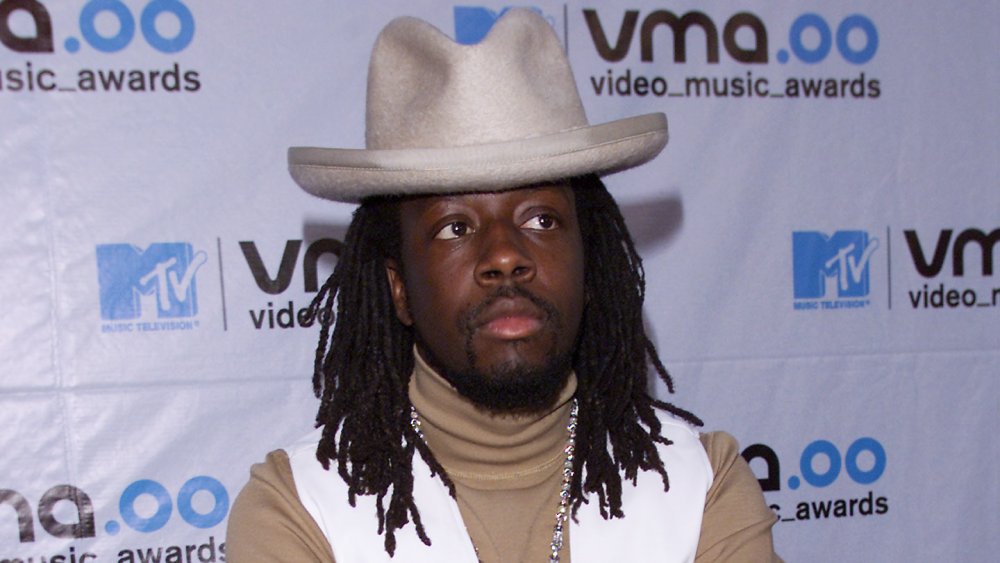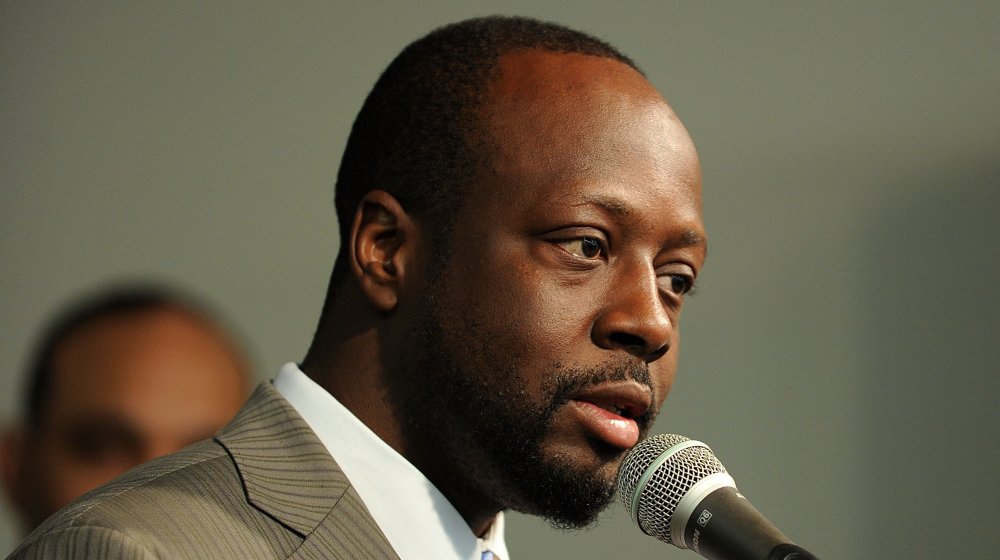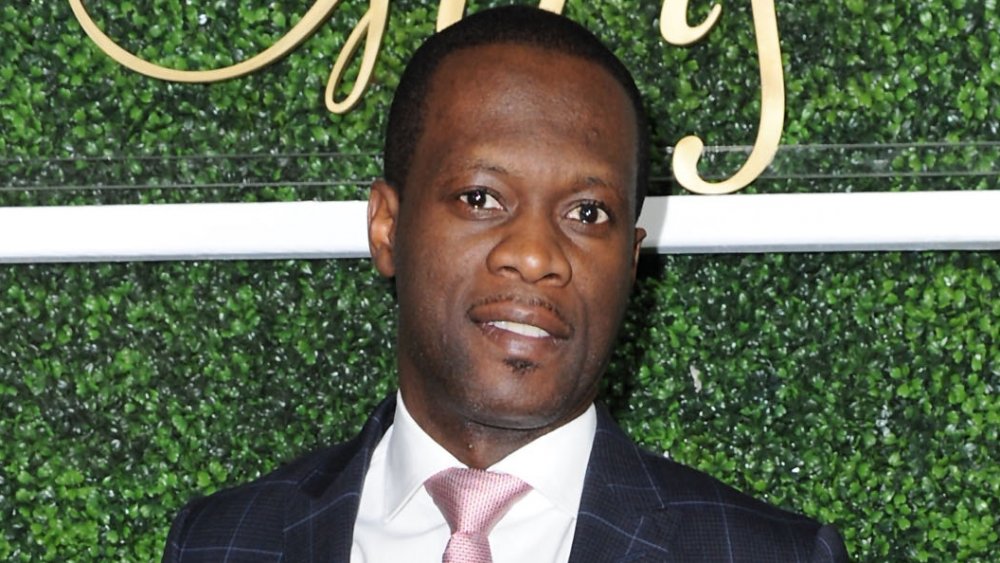Whatever Happened To The Fugees?
On paper, the Fugees shouldn't be as influential as they were. The group made up of Wyclef Jean, Lauryn Hill, and Pras Michel was with us for only a few short years in the 1990s, and they only released two studio albums and a handful of singles. Two of their best-known songs ("Killing Me Softly" and "No Woman, No Cry") are covers, for Pete's sake! In practice, however, whatever they lacked in quantity, they more than delivered in quality. NME calls their 1996 masterpiece The Score "one of the greatest hip-hop albums ever," and points out that their lyrical fireworks, innovative sampling, and blatant disregard for traditional hip-hop gender roles was more than enough to cement their legacy.
However, just because the Fugees as a group are long gone, that doesn't mean the individual stories of Hill, Jean, and Michel are over. In fact, it could be argued that when the Fugees faded away, things were just starting to become exciting for the trio. Come, let's find out what exactly happened to the Fugees.
The real story behind the Fugees' break-up
According to Uproxx, there was no single, huge fight that broke up the Fugees. They were merely "eroded" into non-existence by an assortment of small conflicts that chafed until the center couldn't hold. However, Complex notes that if you ask Wyclef Jean, there was one watershed moment that caused something to "die" between him and Lauryn Hill. Jean (who was married at the time) and Hill were having an affair, and Hill eventually became pregnant. She told Jean that the child was his, but as it turned out, the actual father was Rohan "Bob's son" Marley. To Jean, this "betrayal" meant that the "love spell" between them was broken, and he believes this led to the group's eventual disbanding in 1997.
The Fugees made a quick comeback for some individual concerts and one single in 2004-2005, but this wouldn't last. As the Irish Examiner tells us, in 2007, Pras Michel both pronounced their reunion dead and revealed that it was Hill who didn't wish to keep the group going. As he put it, "You know, unfortunately Miss Hill, she got some things she needs to deal with. I wish her the best, but life goes on."
Lauryn Hill became even bigger than the Fugees
It's hard to name another vocalist who's achieved the status of a "legend" with as few albums as Lauryn Hill. Apart from the two she made with the Fugees, her solo career's sole studio album is 1998's The Miseducation of Lauryn Hill. But as Stereogum points out, it's arguably just as important as (if not more than) the Fugees' sophomore album, The Score. AllMusic considers Miseducation to be an absolute five-star effort that became an ultra-successful crossover record despite being thoroughly uncompromising, and it even spawned a huge hit single in "DooWop (That Thing)." The album went on to win five Grammys.
Releasing a solo album like that directly after the Fugees made Hill a superstar. When Time celebrated 20 years of hip-hop in 1999, the magazine put the 23-year-old Hill on the cover, basically cementing her status as "hip-hop's matriarch." It looked like no one could stop her ... except herself. Just as fast as her star had risen, the musician went away with zero explanation, largely living in a "self-imposed exile" for nearly a decade. Even after this, she's remained behind an interview-shunning veil of mystery, only releasing the occasional single here and there instead of truly picking up where she left. Still, whether she ever records another new song or not, her work with the Fugees and The Miseducation of Lauryn Hill have influenced and impressed countless artists, from John Legend and Nicki Minaj to Kanye West and Jay-Z.
Lauryn Hill's tax evasion troubles
More than one musician has been rendered surprisingly poor because they forgot (or, you know, "forgot") a little thing called taxes. As Rolling Stone tells us, Lauryn Hill managed to take this to the next level in 2013, as she'd completely failed to pay taxes between 2005 and 2009. The taxes she'd failed to pay amounted to over $1 million, so it was time for court.
To be fair, Hill's lawyers pointed out that there were plenty of mitigating circumstances and room for leniency in her federal tax evasion case, due to her charity work and the fact that she'd eventually paid the taxes she owed. Hill also pointed out her that her family and professional situation at the time were in turmoil, as she'd moved away from the music industry to try and "protect" both herself and her children. However, the assistant U.S. attorney on the case called the ex-Fugee's explanations "a parade of excuses centering around her feeling put-upon," which didn't exactly spell sympathy from the officials. As such, Hill was sentenced to three months in prison, plus a year on parole.
Hill's tumultuous family life
Lauryn Hill may prefer to avoid the spotlight and all the drama that fame brings, but her personal life seems to have plenty of drama as it stands. According to Complex, Wyclef Jean says one of the reasons the Fugees broke up was that he was having an affair with Hill, who became pregnant and told Jean the child was his, but in reality, the father was Bob Marley's son, Rohan. If that sounds like daytime soap stuff to you, buckle up, because there's more to come.
Due to the artist's reclusive nature, it's difficult to get up-to-date information about her personal antics, but as Rolling Stone tells us, things were wild in the Hill household around 2011. At this point, Hill had no less than five children with Rohan Marley, and she gave birth to a sixth. There had been rumors that Marley "abandoned" her during her pregnancy, but Hill refuted them ... by saying that the child wasn't Marley's in the first place. Psych!
Hill also revealed that the couple have had "long periods of separation" on many occasions, so perhaps this sort of drama is par for the course for them. Marley certainly responded in an appropriately catty fashion. In two days, he went from having "a tremendous amount of love and respect for the mother of my children" to tweeting "well wishes to Ms. Hill on the birth of her new son." Cold.
The drama behind The Miseducation of Lauryn Hill
Lauryn Hill's 1998 solo album, The Miseducation of Lauryn Hill, may be a landmark record, but it's not entirely without its issues. In this case, though, said issues aren't as musical as much as they're legal. According to Stereogum and Rolling Stone, Hill reportedly either "stole" or failed to properly credit the work of four unnamed musicians who'd participated in the album's production and songwriting process. Naturally, the musicians sued her, and the lawsuit was reportedly settled in 2001 for around $5 million.
The details of the case are unclear, but some say that Hill was frustrated by the long court battle and decided to pay up despite her legal team's advice. Others, however, claim that she really should've given the four musicians both production and co-songwriting credits on no less than 13 of Miseducation's 14 songs, instead of keeping herself as the only writer on 12 of them. The last person to insinuate the latter was Robert Glasper, a jazz musician and former member of Hill's touring band, who in 2018 called Hill out for "stealing" music for Miseducation. He also threw in a few accusations of Hill mistreating tour personnel. Hill later replied to Glasper's claims with a lengthy Medium post. "I may not have established the necessary boundaries and may have been more inviting than I should have been," she wrote, before later concluding, "I may have been inclusive, but these are my songs."
Wyclef Jean tried to become the president of Haiti
One of Wyclef Jean's more interesting adventures came in 2010 when, as Reuters tells us, he registered as a contender for the presidency of his native Haiti. He was aiming to be the candidate for the Viv Ansanm party in an attempt to leverage his pop culture popularity and humanitarian work into an election win, openly comparing himself with Barack Obama with lines like, "I would like to tell President Barack Obama that the United States has Obama and Haiti has Wyclef Jean." As The Guardian explains, Jean's campaign trail was "eccentric" and relied more on the publicity his stardom created than any actual plans to improve the country. It also featured some pretty heavy backlash, to a point that Jean allegedly had to go "in hiding" due to death threats and other security trouble.
There's no telling how well the popular yet politically untested hip-hop star would've succeeded in Haiti — a country that's ravaged by poverty and instability and has an extremely young population — because Jean's bid for candidacy was eventually denied by the electoral council. Though they didn't offer an explanation for their decision, Jean accepted the situation and speculated that he may have breached the electoral law by not residing in Haiti for five straight years.
Wyclef Jean's soccer antics
If you had to guess Wyclef Jean's favorite sport, you'd only have to look at his many collaborations with various soccer entities. According to MLS Soccer, Jean has a good relationship with the New York Red Bulls dating back to at least 2006, when he performed at the club's home opener with Shakira. Later, Jean's Yéle Haiti charity joined forces with the Red Bulls, who sent several players (including national team striker Jozy Altidore, who's of Haitian descent) to visit various Haitian locations and give soccer clinics and seminars. However, Red Bulls is hardly the only soccer organization Jean works with. Florida Today tells us that in 2016, Jean was planning "a music-soccer charitable project" with Fidgi Haig, the women's soccer coach at Florida Tech, though the latter unfortunately passed away before anything could come out of it.
Perhaps the most visible of Jean's many collaborations with the world of soccer came in 2014. As ET Canada tells us, this was when he joined an all-star lineup of Carlos Santana, Avicii, and the Brazilian musician Alexandre Pires to create "Dar Um Jeito (We Will Find A Way)," the official anthem of the 2014 World Cup.
Wyclef Jean became a popular hit-maker after leaving the Fugees
After the Fugees, Wyclef Jean didn't exactly rest on his laurels. He went on to become a sought-after hit-maker for other artists, and he often featured on their songs, as well. He's been nominated for no less than ten Grammy awards, taking home three of them — two with the Fugees and one for his work on Santana's smash-hit album Supernatural.
As Trace tells us, some of the better-known songs Jean has produced over the years include Destiny's Child's "No, No, No Part 2," Whitney Houston's "My Love Is Your Love," Santana's "Maria Maria," and T.I.'s "You Know What It Is." As Billboard notes, the most notable non-Fugees track he's been involved with is arguably Shakira's 2006 smash hit "Hips Don't Lie," which remains the only number one hit Jean has personally featured on (though "Maria Maria" also reached the top of the charts). Oh, and he also kept his own solo career going since the Fugees became a non-entity, scoring numerous hits like 1998's "Gone Till November" and 2008's "Sweetest Girl (Dollar Bill)."
The controversial story behind Jean's charity business
Wyclef Jean has been a great many things, and according to The Independent, he added "philanthropist" to his list of titles by founding a Haiti-based charity called Yéle in 2004. The organization was thrust in the spotlight after January 2010 when an earthquake virtually demolished the country, killing 300,000 people and leaving 1.5 million homeless. Yéle received donations to the tune of $16 million, and suddenly, things got very strange. The charity reportedly spent a hefty $9 million in overhead like "travel, staff salaries, consultant fees, and expenses related to its property portfolio" instead of, you know, helping the poor. Strangely, they also spent a total of $412,000 on renting and "landscaping" an office space ... at a Manhattan studio complex owned by Jean. Hmm.
By 2012, the money was all gone, and Jean and other board members of Yéle faced a team of auditors in a criminal probe over its use. As The New York Times tells us, Jean was quite bitter about the incident, and he claimed in his memoir that the probe was a "crucifixion." And while he points out that he's wealthy enough that he wouldn't exactly need to exploit charity funds, it must be noted that the probe did find a bunch of shady financial stuff in Yéle, and the charity went "effectively bankrupt" in 2012. As a Haitian orphanage manager put it, "If I had depended on Yéle, these kids would all be dead by now."
The post-Fugees ventures of Pras Michel
Pras Michel is arguably a bit of a "third Fugee," if only because the achievements of Wyclef Jean and Lauryn Hill are enough to leave almost anyone in their shadow. Nevertheless, Michel has had solo successes in his own right, and his 1998 single "Ghetto Supastar (That Is What You Are)" made it to number 15 on the Billboard Hot 100 list.
However, the bulk of his creative energy has gone to other artistic endeavors. As his IMDb page reveals, Pras has a pretty robust history as a producer and an actor. He seems to be particularly fond of documentaries, as he's appeared in several and even made one, the Haitian-themed Sweet Micky for President. An interview with XXL Mag tells us that he's also kept stuff going on the business side of things, as he's involved with a media platform called Blacture that has plans to release a "blockchain-based" cell phone called the Motif.
Michel's shady political dealings
There are several crimes you might expect famous musicians to commit. Wrecking your hotel room is a classic. Various substance abuse situations, sure. But trying to funnel millions of dollars in shady Malaysian money in order to gain leverage over the U.S. president? That's not your everyday occurrence. Still, that's precisely what Pras Michel was charged with in 2019, according to The Hollywood Reporter. The indictment says that Michel "participated in a conspiracy" with a scandal-ridden Malaysian businessman named Jho Low in order to "gain access to, and potentially influence, Barack Obama, during his 2012 re-election campaign." Allegedly, Michel used a number of "straw donors" and bank accounts to make significant contributions to Obama's fundraising committee with Low's money.
Michel's charges are a part of a large Malaysian embezzlement case known as 1MDB, which centers on a huge amounts of funds that have gone missing from a public account labeled as "1 Malaysian Development Berhad," and investigators suspect the money has been laundered in many strange ways that include (but aren't limited to) valuable U.S. real estate, expensive classic art, and even the successful yet controversial movie The Wolf of Wall Street. Low was charged with money laundering in 2018, but he remains at large and denies any involvement with anything, up to and very much including Michel's campaign funding shenanigans.
After the Fugees, Pras Michel went on a pirate adventure
In 2012, strange news emerged from the Pras Michel corner of the ex-Fugees camp when TMZ reported that Michel had filed a lawsuit against director Marshall Tyler. The point of contention between the two was a documentary called Paper Dreams, which Michel said he hired Tyler to shoot in 2009. The film, Michel contests, was about an incident where the rapper was "taken captive" by a group of Somali pirates, which was a little strange, seeing as several reports say that Michel was never a pirate hostage himself. Instead, it appears the rapper and his documentary crew witnessed the capture of the Maersk Alabama off the Somali coast (as depicted in one of the most controversial biopics of the decade, Captain Phillips). Artistic license, perhaps?
Regardless of who got (or, rather more accurately, didn't get) caught by pirates, Michel said that despite numerous requests to hand it over, director Marshall Tyler held on to a bunch of documentary footage that was paid for and rightfully Michel's. Meanwhile, Tyler's representative commented, "Pras is trying to assert ownership on material that Marshall owns the copyright to." Seeing as Michel's IMDb page reveals that the documentary still hasn't come out, we can only assume that the stalemate continues.

